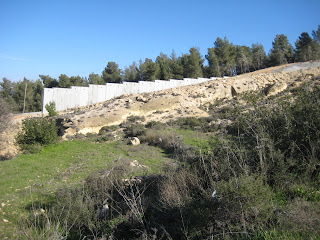Last year, on one of the last days of a class on Collective Memory in the Palestinian/Israeli conflict, we watched a film in which the director takes a Palestinian family to see a photo album from their grandfather, that was confiscated during the 1967 war and was found at the Israel Defense Force archive. In order to take this trip, the director of the film needed to wind his way through Israeli bureaucracy in order to obtain the appropriate permits for the son of the family living in Abu Dis, behind the Israeli separation wall.
 |
| C/o holylandshots.com |
Following the film, asked questions in order to clarify their confusion about this permit system. I was surprised and shocked by these questions. As students of Arabic and Middle Eastern studies, living in Israel/Palestine, only 1 kilometer from the separation wall, and after taking a class about the Palestinian Israel conflict for an entire semester, these students did not even know about one of the most basic institutions of the Israeli occupation that dominates the lives of all Palestinians. This system of bureaucracy, creates an intricate web of distinction determining how human each person is, depending on where they live, for whom they work, and who their parents are?
Identity cards for Palestinians are classified into two categories: blue and green identity cards. Blue ID cards are granted to Palestinians living in Jerusalem. This ID cards allow the holder freedom of movement to wherever they please. Blue ID holders can travel in and out of Jerusalem and the West Bank as they wish. They can also travel through any checkpoint they please.
Green identity cards are granted to Palestinians living in the West Bank. Holders of these ID cards cannot travel to Jerusalem freely. They must obtain a special permit in order to cross through checkpoints into Jerusalem. Normally, these permits are granted around holidays (for one's respective religion) or through one's work organization. Even if a Green ID holder obtains a permit, they are not allowed to go through all checkpoints, as a Blue ID holder is allowed. They may only enter Jerusalem through walking checkpoints, which force them to make their way through a maze of fences, barbed wire, and long lines.
If one is fortunate enough, they may work for an organization in Jerusalem which allows them special privileges as a Green ID holder. They still need a permit, but may enter to Jerusalem through whichever checkpoint they wish.
As a foreigner, I am allowed to cross any checkpoint I wish. Sometimes through a walking checkpoint, my passport may not even be checked because of my foreign appearance. Other times, I flash my passport and am waved across through a checkpoint. When I travel to Jerusalem on the bus through the driving checkpoint with Blue ID holders, I am allowed to sit on the bus, while all Blue ID holders must get off the bus, wait outside in the scorching heat, or cold, rain, and wind in order for their ID's to be checked before being allowed back on the bus. If you are young enough, or old enough, you may be allowed to stay on the bus with foreigners.
Traveling almost every day on this bus, I am often struck by the question propagated by this permit and ID process:
How human are you?
Are you a Jerusalemite, Blue ID holder who is free to move wherever? Are you a Green ID holder in the West Bank, who has a work permit or holiday permit, but only allowed to go through certain checkpoints? Are you a Green ID holder, with a work permit allowing you freedom of movement? Are you a Green ID holder who cannot receive a permit, because you went to a demonstration as a teenager and were put on a black list to never receive a permit? Or are you a Palestinian whose status as a human has changed?
My friend experienced a change in humanity when he moved from working with an organization with an Israeli partner to a organization based in Palestine? With this job change, he went from having a permit that allowed him movement through any checkpoint, to having no permit and not being able to enter Jerusalem at all.
Many Israelis and internationals think that the separation wall only affects those who have previously committed violent acts toward Israelis and thus are a threat to Israeli security. In fact, this is not true. The separation wall, has been built along with the institution of a delicate permit system. This system affects all Palestinians and plays a sick game of determining who is human and who is not, and presents the question: how human are you?
© Devon Forster





























